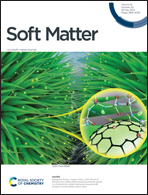Temperature-controlled dripping-onto-substrate (DoS) extensional rheometry of polymer micelle solutions†
Abstract
Capillary-driven thinning of a liquid bridge is commonly used to measure the extensional rheology of macromolecular solutions for assessment of material sprayability, printability, and jettability. Methods like dripping-onto-substrate (DoS) rheometry are often preferred to methods like capillary breakup extensional rheometry (CaBER) due to low required sample volume and ability to measure low-viscosity fluids; however, DoS measurements to-date have been limited to ambient temperatures. Here, an environmental control chamber is developed to enable temperature-controlled DoS (TC-DoS) measurements, and the temperature-dependent extensional rheology of a model system of poloxamer 234 (P234) in NaF brine is examined. Spherical P234 micelles at ambient conditions exhibit inertiocapillary (IC) thinning; above the sphere-to-rod transition temperature, the liquid bridge evolves towards viscocapillary (VC) thinning as micelles lengthen and shear viscosity increases. Above 37 °C, wormlike micelle (WLM) formation results in pronounced elastocapillary (EC) thinning, and further WLM growth and entanglement results in three elasticity-dominated flow regimes: EC thinning, beads-on-a-string (BOAS) instability formation, and BOAS thinning. Despite having a substantially larger amphiphile molecular weight and micelle cross-sectional radius than surfactant WLMs, entangled P234 WLMs exhibit similar extensional behavior and achieve comparable maximum Trouton ratios. Comparing DoS measurements of P234 WLMs with prior studies on surfactant WLMs reveals that the maximum Trouton ratio depends on the ratio of shear and extensional relaxation times, a trend undetectable via CaBER due to pre-deformation during the initial step stretch. These findings reveal rich temperature-dependent flow behaviors in polymer micelles and highlight the importance of using a minimally-disruptive method such as TC-DoS when measuring the extensional rheology of microstructured and thermosensitive fluids.



 Please wait while we load your content...
Please wait while we load your content...
